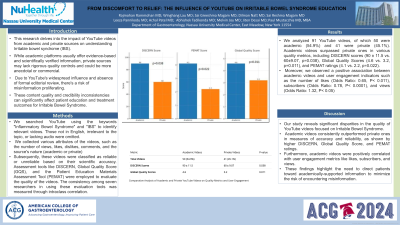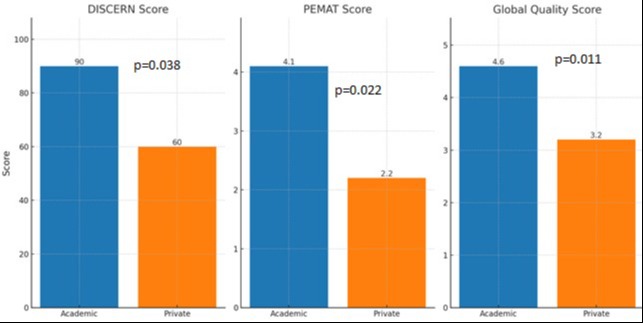Sunday Poster Session
Category: Functional Bowel Disease
P0629 - From Discomfort to Relief: The Influence of YouTube on Irritable Bowel Syndrome Education
Sunday, October 27, 2024
3:30 PM - 7:00 PM ET
Location: Exhibit Hall E

- RR
Rajmohan Rammohan, MD
Nassau University Medical Center
East Meadow, NY
Presenting Author(s)
Raj Mohan Ram Mohan, MD, Sai Reshma Magam, MD, Sai Greeshma Magam, MD, Dilman Natt, MD, Melvin Joy, MD, Winghang Lau, MD, Abhishek Tadikonda, MD, Leeza Pannikodu, MD, Jiten Desai, MD, Krishnaiyer Subramani, MD, Paul Mustacchia, MD, MBA
Nassau University Medical Center, East Meadow, NY
Introduction: This research delves into the impact of YouTube videos from academic and private sources on understanding Irritable bowel syndrome (IBS). While academic platforms usually offer evidence-based and scientifically verified information, private sources may lack rigorous quality controls and could be more anecdotal or commercial. Due to YouTube's widespread influence and absence of formal editorial review, there's a risk of misinformation proliferating. These content quality and credibility inconsistencies can significantly affect patient education and treatment outcomes for Irritable Bowel Syndrome.
Methods: We searched YouTube using the keywords "Inflammatory Bowel Syndrome" and "IBS" to identify relevant videos. Those not in English, irrelevant to the topic, or lacking audio were omitted. We collected various attributes of the videos, such as the number of views, likes, dislikes, comments, and the source's nature (academic or private). Subsequently, these videos were classified as reliable or unreliable based on their scientific accuracy. Assessment tools like DISCERN, Global Quality Score (GQS), and the Patient Education Materials Assessment Tool (PEMAT) were employed to evaluate the quality of the videos. The consistency among seven researchers in using these evaluation tools was measured through intraclass correlation.
Results: We analyzed 91 YouTube videos, of which 50 were academic (54.9%) and 41 were private (45.1%). Academic videos surpassed private ones in various quality metrics, including DISCERN scores (90 ± 11.5 vs. 60±9.07, p=0.038), Global Quality Scores (4.6 vs. 3.2, p=0.011), and PEMAT ratings (4.1 vs. 2.2, p=0.022). Moreover, we observed a positive association between academic videos and user engagement indicators such as the number of likes (Odds Ratio: 0.65, P< 0.011), subscribers (Odds Ratio: 0.78, P< 0.0001), and views (Odds Ratio: 1.32, P< 0.05).
Discussion: Our study reveals significant disparities in the quality of YouTube videos focused on Irritable Bowel Syndrome. Academic videos consistently outperformed private ones in measures of accuracy and reliability, as shown by higher DISCERN, Global Quality Score, and PEMAT ratings. Furthermore, academic videos were positively correlated with user engagement metrics like likes, subscribers, and views. These findings highlight the need to direct patients toward academically-supported information to minimize the risk of encountering misinformation.

Note: The table for this abstract can be viewed in the ePoster Gallery section of the ACG 2024 ePoster Site or in The American Journal of Gastroenterology's abstract supplement issue, both of which will be available starting October 27, 2024.
Disclosures:
Raj Mohan Ram Mohan, MD, Sai Reshma Magam, MD, Sai Greeshma Magam, MD, Dilman Natt, MD, Melvin Joy, MD, Winghang Lau, MD, Abhishek Tadikonda, MD, Leeza Pannikodu, MD, Jiten Desai, MD, Krishnaiyer Subramani, MD, Paul Mustacchia, MD, MBA. P0629 - From Discomfort to Relief: The Influence of YouTube on Irritable Bowel Syndrome Education, ACG 2024 Annual Scientific Meeting Abstracts. Philadelphia, PA: American College of Gastroenterology.
Nassau University Medical Center, East Meadow, NY
Introduction: This research delves into the impact of YouTube videos from academic and private sources on understanding Irritable bowel syndrome (IBS). While academic platforms usually offer evidence-based and scientifically verified information, private sources may lack rigorous quality controls and could be more anecdotal or commercial. Due to YouTube's widespread influence and absence of formal editorial review, there's a risk of misinformation proliferating. These content quality and credibility inconsistencies can significantly affect patient education and treatment outcomes for Irritable Bowel Syndrome.
Methods: We searched YouTube using the keywords "Inflammatory Bowel Syndrome" and "IBS" to identify relevant videos. Those not in English, irrelevant to the topic, or lacking audio were omitted. We collected various attributes of the videos, such as the number of views, likes, dislikes, comments, and the source's nature (academic or private). Subsequently, these videos were classified as reliable or unreliable based on their scientific accuracy. Assessment tools like DISCERN, Global Quality Score (GQS), and the Patient Education Materials Assessment Tool (PEMAT) were employed to evaluate the quality of the videos. The consistency among seven researchers in using these evaluation tools was measured through intraclass correlation.
Results: We analyzed 91 YouTube videos, of which 50 were academic (54.9%) and 41 were private (45.1%). Academic videos surpassed private ones in various quality metrics, including DISCERN scores (90 ± 11.5 vs. 60±9.07, p=0.038), Global Quality Scores (4.6 vs. 3.2, p=0.011), and PEMAT ratings (4.1 vs. 2.2, p=0.022). Moreover, we observed a positive association between academic videos and user engagement indicators such as the number of likes (Odds Ratio: 0.65, P< 0.011), subscribers (Odds Ratio: 0.78, P< 0.0001), and views (Odds Ratio: 1.32, P< 0.05).
Discussion: Our study reveals significant disparities in the quality of YouTube videos focused on Irritable Bowel Syndrome. Academic videos consistently outperformed private ones in measures of accuracy and reliability, as shown by higher DISCERN, Global Quality Score, and PEMAT ratings. Furthermore, academic videos were positively correlated with user engagement metrics like likes, subscribers, and views. These findings highlight the need to direct patients toward academically-supported information to minimize the risk of encountering misinformation.

Figure: Comparative Analysis of Academic and Private YouTube Videos on Quality Metrics and User Engagement
Note: The table for this abstract can be viewed in the ePoster Gallery section of the ACG 2024 ePoster Site or in The American Journal of Gastroenterology's abstract supplement issue, both of which will be available starting October 27, 2024.
Disclosures:
Raj Mohan Ram Mohan indicated no relevant financial relationships.
Sai Reshma Magam indicated no relevant financial relationships.
Sai Greeshma Magam indicated no relevant financial relationships.
Dilman Natt indicated no relevant financial relationships.
Melvin Joy indicated no relevant financial relationships.
Winghang Lau indicated no relevant financial relationships.
Abhishek Tadikonda indicated no relevant financial relationships.
Leeza Pannikodu indicated no relevant financial relationships.
Jiten Desai indicated no relevant financial relationships.
Krishnaiyer Subramani indicated no relevant financial relationships.
Paul Mustacchia indicated no relevant financial relationships.
Raj Mohan Ram Mohan, MD, Sai Reshma Magam, MD, Sai Greeshma Magam, MD, Dilman Natt, MD, Melvin Joy, MD, Winghang Lau, MD, Abhishek Tadikonda, MD, Leeza Pannikodu, MD, Jiten Desai, MD, Krishnaiyer Subramani, MD, Paul Mustacchia, MD, MBA. P0629 - From Discomfort to Relief: The Influence of YouTube on Irritable Bowel Syndrome Education, ACG 2024 Annual Scientific Meeting Abstracts. Philadelphia, PA: American College of Gastroenterology.
